https://en.sputniknews.africa/20230513/real-media-battle-expert-on-western-media-in-africa--related-risks-1059228107.html
'Real Media Battle': Expert on Western Media in Africa & Related Risks
'Real Media Battle': Expert on Western Media in Africa & Related Risks
Sputnik Africa
A number of African nations have succeeded in promoting human rights instruments in terms of media and freedom of expression, Abdou Karim Diakhate publication Director of Le Panafricain's magazine said.
2023-05-13T16:49+0200
2023-05-13T16:49+0200
2023-05-13T16:49+0200
opinion
southern africa
zambia
neocolonialism
russia
ukraine
west
freedom of press
press
https://cdn1.img.sputniknews.africa/img/07e7/05/0d/1059230054_0:48:911:560_1920x0_80_0_0_457df59748d56573107b6afd3c6a6482.jpg
Western nations are using media as a tool for promoting their influence in Africa, and now one can witness the struggle for the continent in that sphere, Abdou Karim Diakhate, specialist in geopolitical issues and director of publication of Le Panafricain magazine told Sputnik on the occasion of the African Media Convention held in Lusaka.Among the reasons why the West is able to carry out its media campaign on the continent, the expert outlined the fact that there are not so many originally African media sources.At the same time, in the West itself the freedom of expression is violated, while some journalists are being oppressed, Diakhate stressed.Blocking Russian media in some Western countries can be considered a discriminatory measure, he stressed.After the beginning of Russia’s special military operation in Ukraine, the European Union banned several Russian public media outlets, including Sputnik. At the time, the European Federation of Journalists, which is in charge of regulating issues connected to media in the EU, denounced the decision.In addition, the expert emphasized that responsibility for the situation concerning the media on the continent lies with Africans themselves. Besides a lack of African media with international coverage, many African countries struggle with problems concerning freedom of expression.In this regard, the expert outlined that the conference is a great opportunity for participants to think about what has to be done in order to further promote journalists' rights and freedom of media on the continent.Diakhate underlined that a number of African nations have succeeded in promoting human rights instruments in terms of media and freedom of expression.The second African Media Convention is being held in Lusaka, Zambia's capital, where participants discuss freedom of expression. The conference, organized on the initiative of the Southern African Publication Forum (SAPF), is taking place a week after global celebrations of World Press Freedom Day. The first such convention was held in Arusha, Tanzania, in 2022.
https://en.sputniknews.africa/20230512/lavrov-slams-western-centric-order-for-establishing-a-neo-colonial-orientation-1059199632.html
https://en.sputniknews.africa/20230501/africa-to-become-worlds-fastest-growing-economy-mo-ibrahim-foundation-estimates-1058970190.html
southern africa
zambia
russia
ukraine
west
Sputnik Africa
feedback@sputniknews.com
+74956456601
MIA „Rossiya Segodnya“
2023
News
en_EN
Sputnik Africa
feedback@sputniknews.com
+74956456601
MIA „Rossiya Segodnya“
Sputnik Africa
feedback@sputniknews.com
+74956456601
MIA „Rossiya Segodnya“
southern africa, south africa, sub-saharan africa, african continent, african country, african countries, southern african publication forum, global celebrations, world press freedom day, russian special military operation, special military operation
southern africa, south africa, sub-saharan africa, african continent, african country, african countries, southern african publication forum, global celebrations, world press freedom day, russian special military operation, special military operation
'Real Media Battle': Expert on Western Media in Africa & Related Risks
The second African Media Convention is being held in Lusaka, Zambia's capital. The convention brings together media experts, academics, students, journalists, unions and associations of journalists, and publishers, both from the public and private sector and consults on problems related to freedom of expression and media.
Western nations
are using media as a tool for promoting their influence in Africa, and now one can witness the struggle for the continent in that sphere,
Abdou Karim Diakhate, specialist in geopolitical issues and director of publication of Le Panafricain magazine told
Sputnik on the occasion of the African Media Convention held in Lusaka.
"There is a real media battle for control and the will to influence African public opinions. It must be said, it was the democratic opening of the 1990s in Africa that allowed the Western media. […] These Western media are often criticized for presenting a negative image that does not always correspond to reality. The images of famine, wars and epidemics go on in a loop, while there are successes, important sectors that deserve to be covered," he mentioned.
Among the reasons why the West is able to carry out its media campaign on the continent, the expert outlined the fact that there are not so many originally African media sources.
"There are very few African media outlets with international coverage and talking about our own news. This is what explains the influence of these Western media," Diakhate stressed.
At the same time, in the West itself the freedom of expression is violated, while some journalists are being oppressed, Diakhate stressed.
"The observation is that not all Western countries are free from any reproach. We often note the direct involvement of governments, a stranglehold exerted on the media by financial groups, the prosecution of journalists who are denied the right to protect their sources of information, the difficulties of access to information," he stated.
Blocking Russian media in some Western countries can be considered a discriminatory measure, he stressed.
"This is certainly a violation of the sacrosanct principle of freedom of the press that these countries put forward in their constitution," the expert noted.
After the beginning of Russia’s special military operation in Ukraine, the European Union
banned several Russian public media outlets, including Sputnik. At the time, the European Federation of Journalists, which is in charge of regulating issues connected to media in the EU, denounced the decision.
"In any case, it is up to the country, in each European country, to file a complaint, in case of violation of the rules for broadcasting any media, with the body responsible for regulating the sector," the expert stated. "This system is essential to protect the press from political interference. So, it was this body that was supposed to rule independently, but the European Council ignored it and the countries [within the European Council] voted directly on the ban by integrating it into the economic sanctions against Russian companies."
In addition, the expert emphasized that responsibility for the situation concerning the media on the continent lies with Africans themselves. Besides a lack of African media with international coverage, many African countries struggle with problems concerning freedom of expression.
In this regard, the expert outlined that the conference is a great opportunity for participants to think about what has to be done in order to further
promote journalists' rights and freedom of media on the continent.
"It is for the participants in this meeting to reflect on the measures to be taken to protect media freedoms and the safety of journalists on the African continent," the specialist said.
Diakhate underlined that a number of African nations have succeeded in promoting human rights instruments in terms of media and freedom of expression.
"Several African countries have made significant progress [in enhancing freedom of media] in accordance with the Declaration Of Principles On Freedom Of Expression And Access To Information In Africa and other human rights instruments," he stated.
The second African Media Convention is being held in Lusaka, Zambia's capital, where participants discuss freedom of expression. The conference, organized on the initiative of the Southern African Publication Forum (SAPF), is taking place a week after global celebrations of World Press Freedom Day. The first such convention was held in Arusha, Tanzania, in 2022.



